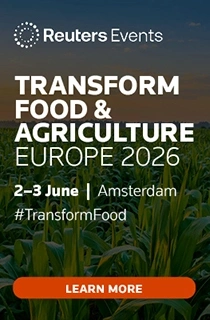
- Industry news
Industry news
- Category news
Category news
- Reports
- Key trends
- Multimedia
- Journal
- Events
- Suppliers
- Home
- Industry news
Industry news
- Category news
Category news
- Reports
- Key trends
- Multimedia
- Events
- Suppliers
Protein priorities: EU Parliament votes to transform plant production amid self-sufficiency alarms

23 Oct 2023 --- The European Parliament (EP) has voted in favor of boosting plant protein production and consumption in a development that could lead to the EU becoming less dependent on animal feed imports while helping to tackle climate change.
The EU is largely self-sufficient in agricultural products due to its Common Agricultural Policy (CAP), but the livestock sector is “critically dependent” on plant-based protein imports for animal feed — especially soybeans — from Argentina, Brazil and the US.
Meanwhile, the EP acknowledges the links between protein imports and deforestation and the substantial GHG emissions from animal farming as reasons to transition to plant-based protein in human nutrition.

In its Protein Strategy briefing, the EP claims that the EU has long aimed to reduce its protein import dependency, but Russia’s invasion of Ukraine has exacerbated the need to shield EU agriculture from price volatility and trade disruptions.
Global grain supply has been severely disrupted by the ongoing Russia-Ukraine war, which has badly impacted Ukraine’s ability to cultivate, harvest and trade the commodity. Before the Russian invasion, the country was known as a “breadbasket” and major wheat producer.
 The EU Parliament concedes the EU’s livestock sector is critically reliant on animal feed imports.While the EU is a net exporter of wheat itself, the impact on prices threatens food affordability for EU citizens on low income.
The EU Parliament concedes the EU’s livestock sector is critically reliant on animal feed imports.While the EU is a net exporter of wheat itself, the impact on prices threatens food affordability for EU citizens on low income.
The legally non-binding, own-initiative report — led by Renew MEP Emma Wiesner within the responsible EP AGRI Committee — came in response to the European Commission’s (EC) announcement last year that it would revise its 2018 report on plant protein development.
Attention turns to Commission
Food awareness organization ProVeg International welcomed the recent parliamentary vote as a “notable milestone” in promoting plant-based diets. It now urges lawmakers to leverage the EU Protein Strategy to elevate plant-based protein availability and demand.
“We invite the Commission to seize this chance to present a more ambitious report to support the future of plant-based and alternative proteins once the final report is published early next year,” says Lucia Hortelano, EU policy manager at ProVeg International.
However, according to Hortelano, the potential for binding targets must take into account the complexity of the food ecosystem.
“Binding targets must be bold, realistic and clearly explained otherwise the pushback can delay progress in increasing the production of high protein crops across Europe,” she tells Food Ingredients First.
“Such targets would also need to take into account the role of farmers and the economic viability of protein crops.”
The EC’s 2018 report proposed to offer farmers incentives to grow more protein crops through national strategic plans as part of the new CAP legal framework, which has been in force since January 2023. ProVeg International encourages more focus on historical protein crops which could be viable for European farms.
ProVeg International encourages more focus on historical protein crops which could be viable for European farms.
Additionally, it identified the potential of EU and national research and innovation programs to enhance the competitiveness of protein crops in the EU and highlighted the importance of market transparency measures to encourage investment from agricultural operators.
Alternative protein diversification
The EP report also encourages the diversification of available protein sources for human food and animal feed to reduce the EU’s deficit. These sources include microbial, insect and seaweed proteins as well as sustainable soy production, further research and innovation in plant-based protein production, environmental transparency and support for leguminous crops.
ProVeg International wants to see more research and innovation activities in various methods of alternative protein production, including:
- Upscaling traditional protein sources like legumes for human consumption.
- Upscaling the promotion of alternative protein sources such as tofu and tempeh.
- Incentivizing agricultural sustainability measures, like eco-scheme programs to encourage farmers to adopt sustainable practices, including crop rotation, intercropping and cover cropping.
- Diversifying protein supply via research into novel crops and breeding of optimal varieties of existing crops.
- Supporting products from precision fermentation.
- Supporting the valorization of agricultural by-products and food waste for plant-, cell- and fungi-based alternatives.
Meanwhile, ProVeg International sees huge potential in using policy tools such as the Sustainable Food Systems Framework and the Protein Strategy report to address the importance of understanding which historical protein crops would be viable for farmers to start cultivating in different regions of Europe.
“There could also be a much stronger focus on the role of and potential advantages for farmers in advancing the development of plant-based and alternative protein sources for the food industry. This is also a field where we believe increased research is necessary. The involvement of EU public R&D would ease the transition for farmers, precisely in the upcoming Horizon Europe Strategic Plan,” says Hortelano.
“In addition, shifting subsidies from animal agriculture to alternative protein production would be an effective way of supporting an increase in foods that can supply the plant-based product markets both in the EU and globally. This could be contextualized in the next CAP to include stronger provisions to incentivize farmers to transition to growing more protein crops for food.”
The EU Protein Strategy was adopted on Tuesday, October 17, with 33 votes to 9 and 3 abstentions.
By Joshua Poole










